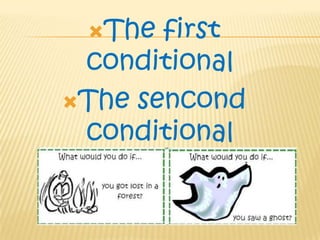
Practica 2
- 2. THE FIRST CONDITIONAL Utilizamos el condicional En primer lugar para hablar sobre eventos futuros que pueden suceder. If we take John, he'll be really pleased. If you give me some money, I'll pay you back tomorrow. If they tell us they want it, we'll have to give it to them. If Mary comes, she'll want to drive. Si tomamos Juan, él estará muy contento. Si me das algo de dinero, yo te lo devolveré mañana. Si nos dicen que lo quieren, tendremos que darle a ellos. Si María se acerca, ella quiere conducir.
- 3. THE FIRST CONDITIONAL The 'if' clause can be used with different present forms.(El "si" cláusula puede ser utilizado con diferentes formas actuales.) If I go to New York again, I'll buy you a souvenir from the Empire State Building. (si voy a Nueva York otra vez, te voy a comprar un recuerdo de el Empire State Building.) If he's feeling better, he'll come. (Si se siente mejor, él vendrá.) If she hasn't heard the bad news yet, I'll tell her. (Si ella no ha escuchado las malas noticias, sin embargo, se lo diré.)
- 4. ESTRUCTURA DEL FISRT CONDICTIONAL Las oraciones condicionales tienen dos partes: 1. la oración subordinada con if que expresa una condición 2. la oración principal que expresa el resultado (si la condición se cumple o no) Hay tres clases de condicionales, cada una de las cuales contiene dos tiempos verbales diferentes. La primera condicional habla de las posibles acciones o acontecimientos que pueden ocurrir o no. La oración condicional comienza con if y va generalmente en presente simple, mientras que la oración principal va generalmente en futuro con “will” y describe lo que ocurrirá si la condición se cumple, o no llega a cumplirse. IF + SUJ + VERB + REST OF SENTENCE /// SUJ + WILL+ VERB+ REST OF SENTENCE
- 5. THE FIRST CONDITIONAL Tanto la oración principal como la subordinada pueden ir en primer lugar, pero si la oración subordinada va en primer lugar, hemos de poner una coma entre ambas. If she likes the dress, she will buy it La primera condicional puede usarse también para hacer sugerencias y dar instrucciones o mandatos. En este uso se puede sustituir “will” por un modal o un imperativo. If you go to Rome, you might visit the Coliseum If you need my help, call me!
- 6. THE SECOND CONDICTIONAL El uso del condicional significa que una acción depende de otra. Los condicionales se utilizan para hablar sobre situaciones reales o irreales. En general, las frases condicionales llevan la palabra "if" (si). Ten en cuenta que no existe un tiempo verbal para el condicional en inglés como existe en español. A la vez, se usa el verbo auxiliar "would" para formar el condicional en inglés.
- 7. THE SECOND CONDICTIONAL Se utiliza el tipo 2 para expresar una posibilidad irreal en el presente, como un deseo o un sueño, o para una acción en el futuro no tan probable. IFCondition ResultIf Past simple"Would" + infinitivo Ejemplos: If I won the lottery, I would travel around the world. / I would travel around the world if Iwon the lottery. (Si ganara la lotería, viajaría alrededor del mundo.) Play If Rachel had more time, she would learn to play the guitar. / Rachel would learn to play the guitar if she had more time. (Si Rachel tuviera más tiempo, aprendería a tocar la guitarra.) Nota: Como en el tipo 1, se pueden usar otros verbos modales en vez de "would" para cambiar el significado y la posibilidad.
- 8. THE SECOND CONDICTIONAL El segundo condicional se usa para hablar de situaciones 'imposibles'. Si estuviéramos en Londres, hoy, sería capaz de ir al concierto en Hyde Park. (If we were in London today, we would be able to go to the concert in Hyde Park. ) Si yo tuviera millones de dólares, que le daría una gran cantidad a la caridad. (If I had millions dollars, I'd give a lot to charity.) Si no hubiera personas que padecen hambre en este mundo, sería un lugar mucho mejor. (If there were no hungry people in this world, it would be a much better place.) Si todos tuvieran agua limpia para beber, no sería una enfermedad mucho menos. (If everyone had clean water to drink, there would be a lot less disease.)
- 9. THE SECOND CONDICTIONAL Tenga en cuenta que después de que él / ella / ella / ello se utilizan a menudo la forma de subjuntivo 'eran' y no 'era'. (Algunas personas piensan que "eran" es la única "correcta" la forma, pero que otras personas piensan "era" es igualmente "correcto".) If she were happy in her job, she wouldn't be looking for another one. .Si ella fuera feliz en su trabajo, no se busca otro. If I lived in Japan, I'd have sushi every daySi yo viviera en Japón, que tendría sushi todos los días.
- 10. THE SECOND CONDICTIONAL Tenga en cuenta la forma Si yo fuera tú", que se utiliza a menudo para dar consejos. If I were you, I'd look for a new place to live. Si yo fuera usted, me gustaría buscar un nuevo lugar para vivir. If I were you, I'd go back to school and get more qualifications. Si yo fuera usted, me gustaría volver a la escuela y conseguir más títulos. El segundo condicional también se utiliza para hablar de "improbable" de las situaciones. If I went to China, I'd visit the Great Wall. If I was the President, I'd reduce taxes. If you were in my position, you'd understand. Si me fui a China, me gustaría visitar la Gran Muralla. Si yo fuera el Presidente, me gustaría reducir los impuestos. Si usted estuviera en mi posición, que lo entenderías.